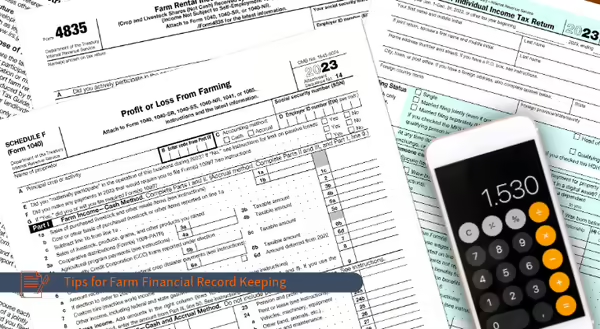
Keeping good financial records is vital for the farm's long-term success. Farm records can get neglected by most farmers who prefer to be out on the property instead of in the office. The following tips, if implemented, can make the farm operation more efficient and stronger and prepare the farm for a family’s future generations.
Previously, the author served as an ag loan officer, and he had farmers come into the office to apply for or to renew loans carrying their receipts and invoices in a shoe box. During the loan application process, recommending loan approval was much easier when the farmer clearly understood their farm's financial health, even if the finances were not particularly strong. Knowledge is power.
Take a Course
Take advantage of adult short courses on record keeping and accounting offered by your local community college. You do not need to become an accountant, but understanding basic financial terms and reports will be helpful. Of course, you can hire professionals to do the work for you, but you are the decision maker. The more you understand your farm finances, the better your operations will be, even if you already have good financial advisors.
Purchase a Good Farm Records System
The system you choose does not have to be the most sophisticated you can buy. The one you choose should fit your needs, personality, and ability. Start by asking your financial advisor or bookkeeper about systems. Research and trial a record-keeping system before you buy. Some products want to save money by using Excel, but professional systems are better with better reporting. This will be beneficial in an audit.
Schedule Time in Your Office
Schedule office hours to work on farm records. Record expenses and income at least once weekly because the longer you go, the more you forget. If someone else in the operation is good at record keeping, assign that part of the business to them. As the principal proprietor of the farm, make sure you are actively involved and fully understand the farm's records and reports. Resist the urge to bring in statements and receipts and leave their recording to someone else. If you get behind at planting or harvest, have a filing system with categories where you can at least put receipts in the correct folder.
Use Dedicated Credit Cards When You Can
Your credit card company provides billing statements, and though you should keep all receipts, having a credit card statement will help you remember transactions. Bill Pay with your bank is another option you can use online from your checking account. Handwritten checks are another alternative, but they are becoming less common as digital payments with apps such as Venmo are becoming more popular. Avoid using cash, as losing receipts is so easy to do. Keep business and personal checking/savings accounts separate.
Make Record Keeping Easier
Many banks allow you to download bank statements into your farm accounting software rather than inputting each transaction separately. Choose a bank and software that offers this service. The time you save downloading transactions will be surprising, though you may have to edit these transactions. Many farm records software programs will allow you to attach digital copies of bills to the transaction entered in your system, and this process takes time. Decide whether you will 1) digitize all receipts, 2) digitize only more considerable expenses, or 3) specific categories. Whatever you choose, you must be consistent. Keep all hard copies of receipts and invoices. Invest in a high-speed scanner and batch scan multiple receipts to make attaching copies easier.
Do an End of the Year Review
Becoming good at finding errors is a skill you can develop as you gain experience. Even if you make errors corrected by your accountant or tax advisor, create the following reports from your record-keeping system. Look up these reports and learn how to create them in your system:
- Profit and Loss
- Balance Sheet
- Cash Flow Statement
- Statement of Changes in Equity
- Receipts and Payments Summary
- Trial Balance
Compare Your Farm
There are different ways to evaluate your farm. For example, from your balance sheet, your farm can be scored for financial strength by color-coded categories: Good, Caution, or Weak. Your farm can be compared to itself year by year on important reports with financial ratios and working capital. In Illinois, we have Farm Business Farm Management (FBFM)
https://www.fbfm.org/, which is a cooperative of other farmers that provides various farm record-keeping services, including tax computation, record-keeping assistance, and in-depth financial analysis. Similar organizations exist in the regional area.
Take control of your farm’s financial future. Your farm operation will be stronger for it.